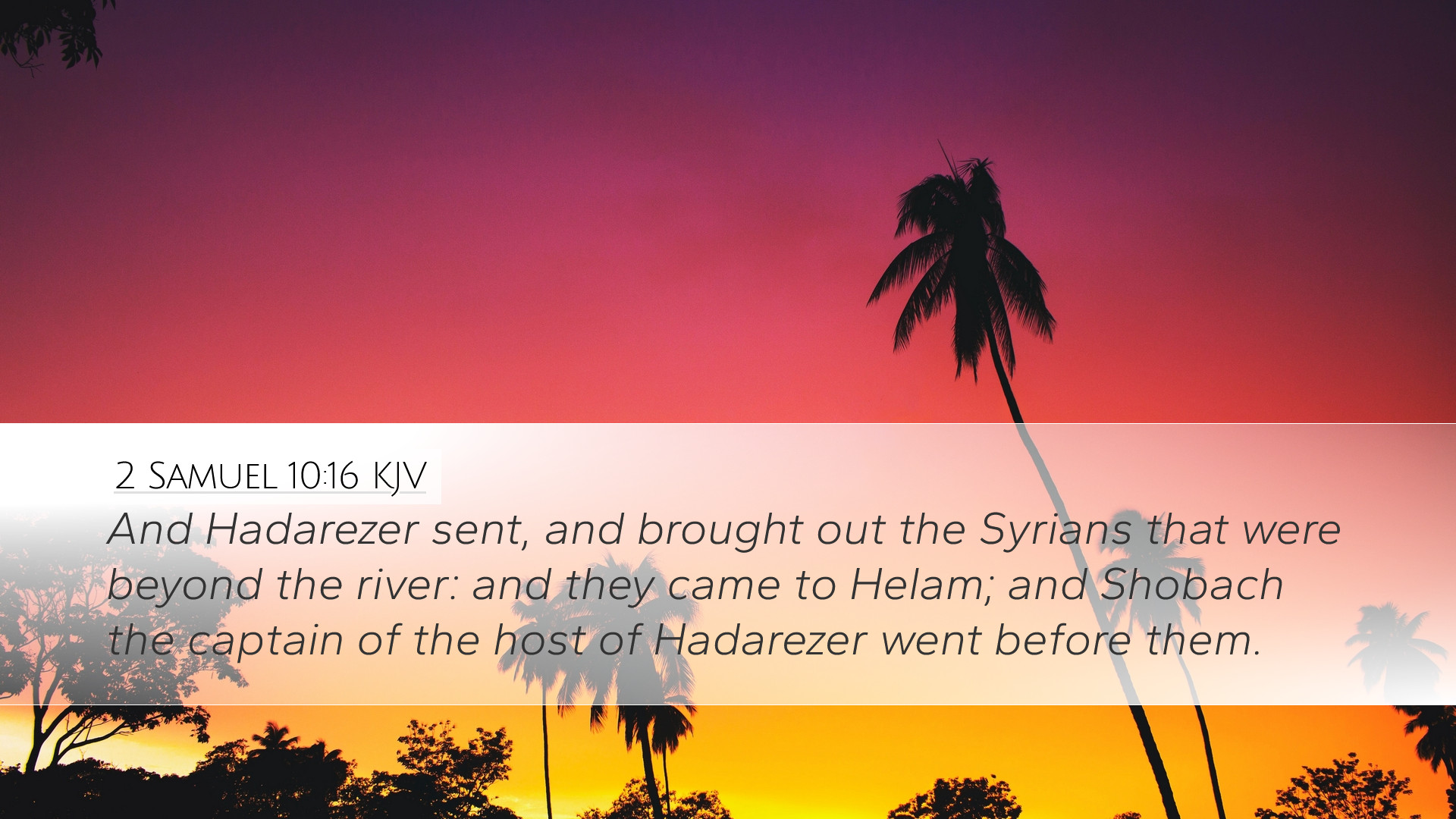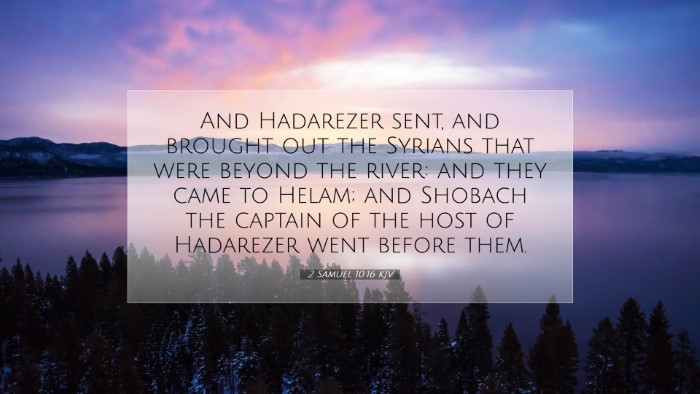Old Testament
Genesis Exodus Leviticus Numbers Deuteronomy Joshua Judges Ruth 1 Samuel 2 Samuel 1 Kings 2 Kings 1 Chronicles 2 Chronicles Ezra Nehemiah Esther Job Psalms Proverbs Ecclesiastes Song of Solomon Isaiah Jeremiah Lamentations Ezekiel Daniel Hosea Joel Amos Obadiah Jonah Micah Nahum Habakkuk Zephaniah Haggai Zechariah Malachi2 Samuel 10:16
2 Samuel 10:16 KJV
And Hadarezer sent, and brought out the Syrians that were beyond the river: and they came to Helam; and Shobach the captain of the host of Hadarezer went before them.
2 Samuel 10:16 Bible Commentary
Commentary on 2 Samuel 10:16
Verse Reference: 2 Samuel 10:16
This verse captures a significant moment in the narrative of David's reign and highlights both the political dynamics of the era and the spiritual implications of conflicts faced by the Israelites. The surrounding context involves the Ammonites and their alliance with the Syrians, marking a period of tension that provides rich theological and moral insights.
Contextual Background
The political landscape in the time of 2 Samuel was fraught with warfare, alliances, and betrayals. Following the death of Nahash, king of the Ammonites, David sought to extend kindness to his son Hanun. However, this gesture of goodwill was met with suspicion and led to conflict that would escalate into a military confrontation. The historical context is vital for understanding the deeper meanings behind the events that unfold.
Analysis of the Verse
In 2 Samuel 10:16, we see the response of the Syrians to the advancing military threat posed by David's forces. This reaction can be viewed through several lenses:
- Political Alliances: The alliances formed during this period, particularly between the Ammonites and the Syrians, illustrate the complexities of foreign relations in the ancient Near East. This verse exemplifies how regional powers often banded together against a common foe.
- Military Strategy: The strategic movements of the Syrians indicate a defensive posture, aimed at countering the advances of David's forces. This brings to light the importance of military alliances and tactical maneuvering in the biblical narrative.
- Spiritual Implications: The tensions captured in this verse also serve to illustrate the broader spiritual warfare that exists. The conflicts faced by David and Israel extend beyond the physical realm and highlight God's providence and sovereignty, as He guides the outcomes of these battles.
Insights from Commentators
Matthew Henry's Commentary
Matthew Henry emphasizes the significance of David's character and leadership during this tumultuous period. He notes that David's initial outreach to Hanun reveals his desire for peace and unity; however, he is met with hostility and betrayal. Henry points to the folly of the Ammonites in rejecting David's overture, comparing their actions to those who scorn the overtures of God's grace. Furthermore, he posits that the subsequent military engagements reflect not just human conflict, but also the overarching battle between the forces of good and evil.
Albert Barnes' Notes on the Bible
Albert Barnes provides detailed commentary on the political ramifications of 2 Samuel 10:16. He notes that the decision of the Syrians to engage with the Ammonites represents a significant alliance that threatens David's kingdom. Barnes draws attention to the historical context, explaining how such alliances could shift the balance of power in the region. He also comments on the nature of human pride and distrust, as displayed by Hanun's decision to refuse David's kindness, serving as a cautionary tale about the dangers of misunderstanding goodwill.
Adam Clarke's Commentary
Adam Clarke delves into the specifics of the military dynamics within this passage. He contextualizes the verse by exploring the geographical and strategic elements involved in the conflict. Clarke notes that the Syrians, described in other parts of Scripture as formidable warriors, prepared their forces to stand against Israel. He also highlights the failures of leadership on both sides, reflecting on how difficult it is for leaders to navigate the complexities of international relations. Moreover, Clarke alludes to the notion of faith amidst adversity, noting the divine hand guiding events despite human opposition.
Theological Reflections
The theological implications of 2 Samuel 10:16 resonate deeply with audiences today. The tensions and conflicts in this passage parallel many contemporary issues regarding distrust, aggression, and the longing for peace. As pastors and theologians reflect on this verse, they might consider the following themes:
- God’s Sovereignty: Despite the conflict, God's plan remains sovereign over the events of history, and His purposes will ultimately prevail.
- The Nature of True Leadership: David’s attempts at reconciliation contrast sharply with Hanun’s perceived betrayal, challenging modern leaders to pursue wisdom and humility in their dealings with others.
- Hope and Restoration: Amidst strife, there is always a chance for reconciliation and peace, echoing the broader narrative of hope found throughout Scripture.
Conclusion
In examining 2 Samuel 10:16 through the lenses of historical context, commentary insights, and theological reflection, this verse becomes a microcosm of the larger biblical narrative of struggle, conflict, and divine sovereignty. Both ancient and modern audiences can draw parallels from this text, considering how issues of leadership, alliance, and conflict continue to unfold in their own contexts. The message remains clear: while the human condition is marred by strife and misunderstanding, God’s faithfulness endures, offering a pathway to peace and restoration.


